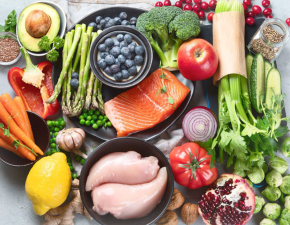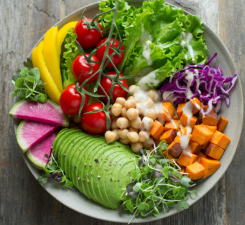Cholesterol is one of the important substances in the human body, with multiple functions such as maintaining cell membrane structure, synthesizing hormones and bile acids. However, high cholesterol levels are closely related to the occurrence of cardiovascular diseases, so maintaining healthy cholesterol levels is essential for preventing cardiovascular diseases. Choosing some healthy foods in your diet can help lower cholesterol levels and further reduce the risk of cardiovascular diseases.

The role of cholesterol
Cholesterol is a lipid substance in the human body. Its main function is to form cell membranes, produce hormones and bile acids, etc., and it plays a vital role in the normal physiological functions of the human body.
The relationship between high cholesterol and cardiovascular disease
High cholesterol levels are one of the main risk factors for cardiovascular disease, because high cholesterol levels can lead to atherosclerosis, which in turn leads to the occurrence of serious diseases such as coronary heart disease and stroke. Therefore, maintaining a healthy cholesterol level is very important for preventing cardiovascular disease.
How to use diet to lower cholesterol levels
Avoid saturated fatty acids
Saturated fatty acids are the main cause of elevated cholesterol, so you should try to avoid or reduce the intake of saturated fatty acids. Saturated fatty acids are mainly found in animal products such as red meat, cream, cheese, and butter, so you should try to reduce the intake of these foods.
Increase the intake of unsaturated fatty acids
Unlike saturated fatty acids, unsaturated fatty acids are beneficial for lowering cholesterol. Vegetable oils (such as olive oil and rapeseed oil) contain a lot of unsaturated fatty acids, so you should try to use these oils to cook food.
Increase the intake of dietary fiber
Dietary fiber can help the body excrete excess cholesterol, thereby lowering cholesterol levels. Fruits, vegetables, whole grains and beans are all foods rich in dietary fiber, and the intake of these foods should be increased as much as possible.
Increase foods rich in plant sterols
Plant sterols are natural substances with a similar structure to cholesterol, but they are not absorbed by the body like cholesterol. Therefore, consuming enough plant sterols can lower cholesterol levels without affecting nutrition. Nuts, seeds, beans, whole grains, and some other foods (such as butter substitutes) are rich in plant sterols.
Increase protein-rich foods
Protein-rich foods such as milk, cheese, meat and eggs can also help lower cholesterol levels, but their intake should be controlled and low-fat products should be chosen as much as possible.

Foods that can promote cholesterol metabolism and lower cholesterol include
Black sesame:
sweet, neutral. It belongs to the liver, kidney and large intestine meridians. It has the effects of nourishing the liver and kidney, benefiting the essence and blood, and moistening the intestines.
Scientific research shows that the antioxidant capacity of sesamol in sesame is 10 times that of the hyperlipidemia treatment drug probucol. In addition, after the sesame alcohol glycoside components contained in sesame seeds are ingested by the human body, the intestinal bacteria will convert them into sesamol, which also shows strong antioxidant capacity.
Soybean:
Soybean is also called yellow soybean and is called the "king of beans". It is flat in nature and sweet in taste. It has the effects of nourishing qi and blood, strengthening the spleen and promoting water, draining pus and removing toxins, and reducing swelling and relieving pain.
Soybeans contain soybean saponin, soybean isoflavones and lecithin, which has the effect of preventing arteriosclerosis. Soybean saponin has the effect of preventing the increase of lipid peroxidation, inhibiting the oxidation of bad cholesterol, and promoting lipid metabolism and preventing obesity.
Nuts:
Nuts are rich in nutrients such as protein, oil, vitamins and minerals, and have the effects of lowering cholesterol, improving skin, and nourishing the brain.
Shiitake mushrooms:
Shiitake mushrooms contain shiitake purine, which can promote the metabolism of cholesterol in the liver and inhibit the increase of cholesterol in the blood. This ingredient is more abundant in the umbrella-shaped part of shiitake mushrooms. According to relevant research reports, consuming 9 grams of dried shiitake mushrooms (about two) a day for a week can reduce cholesterol levels.
Citrus fruits:
including tangerines, oranges, grapefruits, tangerines, stone oranges, kumquats, Pingshan pomelo, Australian finger oranges, late white grapefruits, four-season oranges, mountain oranges, real oranges, etc. These fruits contain vitamin C, which has an antioxidant effect and can prevent bad cholesterol from being oxidized. Moreover, it can also promote the synthesis of collagen in cell connective tissue and strengthen the organization of vascular cells.
Olive oil:
The fatty acids contained in olive oil belong to oleic acid in monounsaturated fatty acids. Oleic acid can reduce bad cholesterol while maintaining the amount of good cholesterol, so that the lipids in the blood remain balanced. In addition, olive oil can reduce glycated hemoglobin and fasting blood sugar.
